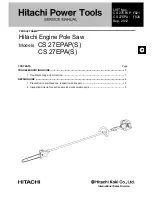
GB
- 28 -
•
Move the support bearings (44, 45, 46) to the
point where they just stop touching the blade
(26) (max. 0.5 mm gap).
•
Re-tighten the socket head screws with the
hex key (57).
•
Important! If you fit a blade with a different
width, you can shift the complete lower bea-
ring unit (47) such that all 3 support bearings
(44, 45, 46) are shifted in one go.
•
To do so, use the 4 mm hex key (57) to
slacken the 4 mm socket head screw (48).
Move the lower bearing unit (47) to the point
where the rear support bearing (46) just stops
touching the blade (max. 0.5 mm gap). Then
re-tighten the socket head screw (48).
•
Important! The blade will be rendered useless
if the side support bearings (44, 45) touch
the blade teeth! Adjust the depth of the side
support bearings with the socket head screw
(48).
•
Close the side cover (12) again.
Important! After you have adjusted the upper and
lower support bearings:
•
Turn the blade pulley several turns by hand.
•
Check the adjustment of the support bearings
and make corrections as required.
5.5 Adjusting the upper blade guide (Fig. 11)
•
Undo the locking handle (32).
•
Turn the adjustment wheel (31) to lower the
blade guide (11) as close as possible to the
workpiece to be cut (approx. 2-3 mm gap).
•
Re-tighten the locking handle (32).
•
Check the adjustment before each cut and
make corrections as required.
5.6 Adjusting the saw table to 90° (Fig. 12)
•
Adjust the blade guide to maximum height
(see 5.5).
•
Slacken the wing handle (18) (see 5.1).
•
Slacken the lock nut (34).
•
Place a 90° set-square (a) between the blade
(26) and the saw table (15). (This product
does not come with a set-square (a))
•
Turn the stop screw (33) in or out with the hex
key (57) in order to tilt the saw table (15) until
it is at an angle of exactly 90° to the blade
(26).
•
Re-tighten the lock nut (34) to secure this set-
ting.
•
Use the wing handle (18) to re-fasten the saw
table (15).
5.7 Blade selection
The blade supplied with the bandsaw is designed
for all-purpose use. When you select a blade you
should consider the following criteria:
•
With a narrow blade you can cut tighter radii
than with a wide blade.
•
Wide blades are used to saw straight cuts.
This is particularly important when cutting
wood because the blade has a tendency to
follow the grain of the wood and therefore to
deviate easily from the cutting line.
•
Finely toothed blades provide smoother cuts
but are slower than coarse blades.
Caution! Never use warped or lacerated bla-
des!
5.8 Replacing the blade (Figure 1/13)
•
Open the two side covers (12) by slackening
the fastening handles (13).
•
Remove the guide rail (37) (see 5.1).
•
Tilt the saw table (15) to 45°.
•
Turn the cover (50) away to the front.
•
Re-set the saw table (15) to 90°.
•
Pull the push-in cover (51) up and out.
•
Move the blade guide (11) into a position half
way between the saw table (15) and the ma-
chine housing (25).
•
Turn the tightening screw (9) counterclockwi-
se to remove the tension from the blade (26).
•
Remove the blade (26) from the blade pulleys
(7, 8) and take it out through the slot in the
saw table (15).
•
Fit the new blade (26) on the two blade pul-
leys (7, 8).
•
Caution! Pay attention to the running direc-
tion. The cutting angle of the teeth must point
in running direction, i.e. downwards from the
upper blade guard (11). (See the arrow on the
upper side cover (12)).
•
Re-insert the push-in cover (51).
•
Tilt the saw table to 45° in order to turn the
cover (50) to the rear, to re-adjust the saw ta-
ble (15) to 90° and to re-fit the guide rail (37).
•
Tension and adjust the new blade (26), and
adjust the upper and lower support bearings
(see 5.2, 5.3, 5.4).
•
Close the side cover (12).
•
Warning! Each time after the blade (26) is
changed, check that it runs freely in the table
insert (17) when set to perpendicular and
also when set to 45° (with the saw table (15)
tilted).
•
Check that all safety devices are in good wor-
king order before you begin working with the
Anl_TC-SB_245_L_SPK9.indb 28
19.11.2020 08:10:09
Summary of Contents for 43.080.35
Page 8: ... 8 21b 22 23 24 54 54 2 7 53 55 11 Anl_TC SB_245_L_SPK9 indb 8 19 11 2020 08 09 38 ...
Page 164: ... 164 Anl_TC SB_245_L_SPK9 indb 164 19 11 2020 08 10 31 ...
Page 165: ... 165 Anl_TC SB_245_L_SPK9 indb 165 19 11 2020 08 10 31 ...
Page 166: ...EH 11 2020 01 Anl_TC SB_245_L_SPK9 indb 166 19 11 2020 08 10 31 ...
















































